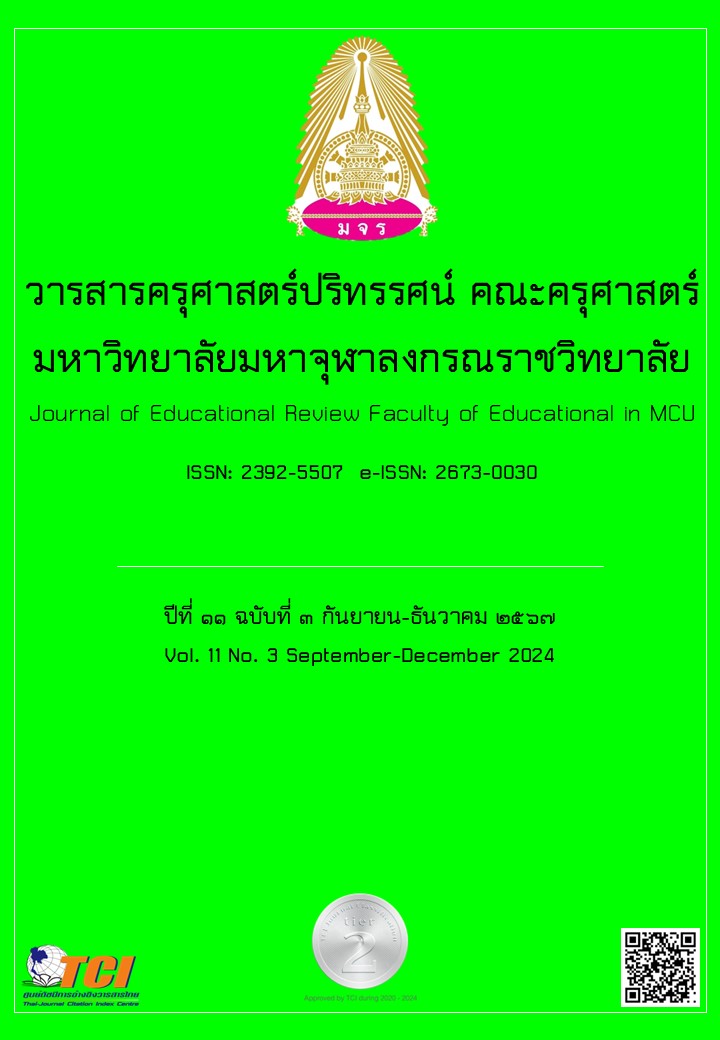GUIDELINES FOR THE DEVELOPMENT OF EXECUTIVE CHARACTERISTICS IN THE 21ST CENTURY ACCORDING TO THE THREEFOLD LERANING PRINCIPLE OF THE SAMAKKHITHAM SCHOOL GROUP PHRA NAKHON SI AYUTTHAYA PROVINCE
Main Article Content
Abstract
This research aims to 1) study the characteristics of executives in the 21st century, 2) study the methods for developing the characteristics of executives in the 21st century according to the Tri-sikkha principle, and 3) propose guidelines for developing the characteristics of executives in the 21st century according to the Tri-sikkh principle (Threefold learning). This research is a mixed-method research using a questionnaire of the entire population in the research, consisting of 113 people. Data were analyzed using research statistics, including frequency, percentage, mean, standard deviation, and interviewing with 6 key informants. Data were analyzed using content analysis. The research results found that 1) Overall, the characteristics of executives in the 21st century were practiced at a high level. When classified by aspect, all 4 aspects were practiced at a high level, namely, leadership, personality, academics, and ethics, respectively. 2) Methods for developing the characteristics of executives in the 21st century according to the Tri-sikkh principle consisting of (1) Personality aspect: Executives should dress appropriately, politely, neatly, and appropriately, having a suitable personality (Morality), being polite, gentle, calm, and careful, having self-confidence (Concentration), being mature and able to control their emotions, and behaving as a good example to subordinates (Wisdom). (2) Leadership aspect: Executives could build a team, must dare to think, dare to make decisions based on the correct principles (Morality), being able to motivate others and eager to achieve results (Concentration), dare to trust others, seeing others as equal and their strengths (Wisdom). (3) Academics: Executives were academic and professional leaders, having knowledge and understanding of the scope of academic administration (Morality), could create an environment conducive to learning, supporting the organization and production of media (Concentration), having knowledge of management principles, management techniques and applying innovation and technology in administration (Wisdom). (4) Ethics: Executives behave in accordance with the framework of professional ethics with honesty, adhering to rules and regulations, ethics (Morality), selfless, considering the public interest more than personal interest (Concentration), having compassion for colleagues, and being fair to colleagues (Wisdom). And 3) Guidelines for developing characteristics of executives in the 21st century according to the Trisikkh principle, consisting of (1) Personality: Executives should dress appropriately, using polite words, knowing how to use reason to solve problems, being fair, having quick wit, knowledge and skills in technology. (2) Leadership: Executives should be thoughtful, prudent in their work, and could motivate school members, having the intelligence to solve problems. (3) Academically, administrators should set academic policies, goals and strategies, planning academic development, managing human resources and budgets, having the ability to create an environment conducive to learning, experience in academics, teaching, research, promoting and supporting all parties to participate in curriculum development. (4) Moral ethics, administrators should behave according to the 5 precepts that were the foundation of life, having compassion for coworkers, diligently training themselves to be respectable, being fair to coworkers, creating values and instilling good consciousness in work.
Article Details

This work is licensed under a Creative Commons Attribution-NonCommercial-NoDerivatives 4.0 International License.
ทัศนะและความคิดเห็นที่ปรากฏในบทความในวารสารฉบับนี้ถือเป็นความรับผิดชอบของผู้เขียนบทความนั้นเพียงผู้เดียว และไม่ถือเป็นทัศนะและความรับผิดชอบของกองบรรณาธิการ
กองบรรณาธิการขอสงวนสิทธิ์ในการคัดเลือกบทความลงตีพิมพ์และจะแจ้งให้เจ้าของบทความทราบหลังจากผู้ประเมินบทความตรวจอ่านบทความแล้ว
ต้นฉบับที่ได้รับการตีพิมพ์ในวารสารครุศาสตร์ปริทรรศน์ คณะครุศาสตร์ มหาวิทยาลัยมหาจุฬาลงกรณราชวิทยาลัย ถือเป็นกรรมสิทธิ์ของคณะครุศาสตร์ มหาวิทยาลัยมหาจุฬาลงกรณราชวิทยาลัย ห้ามนำข้อความทั้งหมดหรือบางส่วนไปพิมพ์ซ้ำ เว้นเสียแต่ว่าจะได้รับอนุญาตจากมหาวิทยาลัยฯ เป็นลายลักษณ์อักษร
References
ชยาภรณ์ จันโท. (2560). การศึกษาคุณลักษณะของผู้บริหารสถานศึกษา ที่ส่งผลต่อการจัดการศึกษา ในศตวรรษที่ 21 ของสถานศึกษา สังกัดสำนักงานเขตพื้นที่การศึกษาประถมศึกษาพังงา. วารสารวิชาการมหาวิทยาลัยราชภัฏภูเก็ต. 13(1).304.
ชัยยนต์ เพาพาน. (2558). การจัดการศึกษาเพื่อพัฒนาท้องถิ่นสู่ประชาคมอาเซียน: ทิศทางใหม่ในศตวรรษที่ 21. กาฬสินธุ์: มหาวิทยาลัยกาฬสินธุ์.
ชัยยนต์ เพาพาน. (2560). ภาวะผู้นำทางการศึกษาและนวัตกรรมทางการบริหาร: กระบวนทัศน์ใหม่ในศตวรรษที่ 21 ของผู้บริหารสถานศึกษา. กาฬสินธุ์: มหาวิทยาลัยกาฬสินธุ์.
ชีวสาธน์ กิ่งแก้ว. (2566). คุณลักษณะผู้บริหารสถานศึกษาที่ส่งผลต่อขวัญในการปฏิบัติงานของครู สังกัดสำนักงานเขตพื้นที่การศึกษาประถมศึกษาฉะเชิงเทรา เขต 1. แหล่งที่มา http://thesis.rru.ac.th/frontend/view/678# สืบค้นเมื่อ 6 มิ.ย. 2566.
พรทิพย์ สุขเอียด. (2562). คุณลักษณะที่พึงประสงค์ของผู้บริหารตามทัศนะของครู สังกัดสำนักงานเขตพื้นที่การศึกษาประถมศึกษาสงขลา เขต 3. สารนิพนธ์ศึกษาศาสตรมหาบัณฑิต. มหาวิทยาลัยหาดใหญ่.
พระครูโอภาสนนทกิตติ์ (ศักดา โอภาโส). (2557).การวิเคราะห์ทักษะภาวะผู้นำของผู้บริหารตามหลักพุทธธรรมโรงเรียนวิถีพุทธระดับประถมศึกษา จังหวัดนนทบุรี. ดุษฎีนิพนธ์พุทธศาสตรดุษฎีบัณฑิต มหาวิทยาลัยมหาจุฬาลงกรณราชวิทยาลัย
พระปลัดมงคล วราสโย (เรืองอาคม). (2562). แนวทางการพัฒนาคุณลักษณะผู้บริหารตามหลักพรหมวิหาร 4 โรงเรียนประถมศึกษา อำเภอพระประแดง จังหวัดสมุทรปราการ. วิทยานิพนธ์พุทธศาสตรมหาบัณฑิต. มหาวิทยาลัยมหาจุฬาลงกรณราชวิทยาลัย.
พระสมุห์ยุทธนา อนุทโย (กรใหม่). (2565). รูปแบบการพัฒนาคุณลักษณะที่พึงประสงค์ตามหลักกัลยาณมิตรสำหรับ ผู้บริหารสถานศึกษาสังกัดสำนักงานเขตพื้นที่การศึกษามัธยมศึกษา เขต 1. ดุษฎีนิพนธ์ครุศาสตรดุษฎีบัณฑิต. มหาวิทยาลัยมหาจุฬาลงกรณราชวิทยาลัย.
สงวน สุทธิเลิศอรุณ. (2550). วิชาการสำนักงานคณะกรรมการการประถมศึกษาแห่งชาติ. กรุงเทพมหานคร: โรงพิมพ์คุรุสภาลาดพร้าว.
Aydin, B. (2012). Transformational Leadership Behaviors of School Principals: A Qualitative Research Based on Teachers Perceptions. International Online Journal of Educational Sciences. 4(3). 12.


